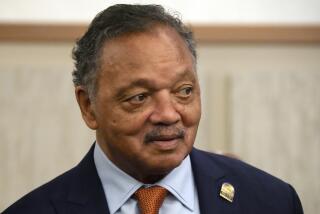NAACP Likely to Pick New Leader Today : Civil rights: The group is seeking to rejuvenate itself after period of decline. Three finalists are listed. Jackson had faced strong opposition.
- Share via
ATLANTA — The NAACP today is expected to choose a new leader and perhaps chart a new direction as the 84-year-old civil rights organization strives to rejuvenate itself after an extended period of stagnation and decline during what has been called America’s “post civil rights era.”
The 64-member executive board is meeting in Atlanta to select a new executive director to take over from Benjamin L. Hooks, 68, who is resigning after 15 years at the helm.
The three finalists for the job are: the Rev. Benjamin Chavis, 45, head of the United Church of Christ’s Commission for Racial Justice; Jewell Jackson McCabe, 47, founder of the National Coalition of 100 Black Women; and Earl Shinhoster, 42, the NAACP Southeastern regional director.
The Rev. Jesse Jackson, the most charismatic and well-known applicant, withdrew from consideration Wednesday, citing a proposed change in the organization’s constitution that he said would weaken the director’s position.
But one member of the executive board contended that the two-time presidential candidate dropped out because he realized he did not have the votes to win. “I only knew one person on the entire board who was voting for Jesse Jackson,” said Gentry W. Trotter, an executive board member from St. Louis. “Maybe there are two or three more in the closet but I only knew of one.”
Published reports had indicated that Jackson was ranked first among the finalists by the selection committee that passed its recommendations on to the executive board last week.
Jackson partisans had touted his high name recognition, oratorical gifts and ability to spark excitement, saying such qualities are badly needed at the 500,000-member NAACP, which is in the position of having to re-establish its preeminence, especially to young people who do not personally remember the civil rights struggles that led to the end of racial segregation.
However, Jackson’s candidacy drew a strong response from much of the NAACP rank and file, many of whom reportedly wrote letters to members of the executive board opposing his selection.
Some members complained that his personal style and Lone Ranger approach to problem solving were antithetical to the venerable organization’s more deliberate methods. Many also questioned his abilities as a manager.
Jackson announced his withdrawal in a letter to the executive board that said he decided to withdraw after reflecting on a proposed rule change that would broaden the board’s powers over day-to-day functions.
“Even if my No. 1 ranking is upheld by the full board of directors, it would not be in the best interest of the NAACP membership for me to continue to permit my name to be considered,” Jackson wrote.
The letter sparked an angry response from Trotter, who said the rule change would merely return the organization to the rules that had existed until a few years ago.
“I think his representations in the five-page letter to us is indicative of the type of roller coaster ride we would’ve been involved with (had he been selected),” said Trotter.
“If I wanted a roller coaster ride I’d go to Disney World,” he said.
Power had become consolidated in the executive director’s office after Hooks won a much publicized dispute with the then-chairman of the board, Margaret Bush Wilson, in 1983.
Wilson was stripped of her powers by other board members after she suspended Hooks for eight days and sharply criticized his leadership of the organization, blaming him for dramatic decreases in NAACP membership, high turnover of top staff, unpaid bills and low morale.
The proposed rule change would restore a structure in which the executive director and the board share power, with the board chairman assuming added control over day-to-day functions.
Hooks’ contract technically expired March 31, but, after the selection committee decided last month to pass its top four candidates on to the entire executive board rather than make a final selection, he agreed to stay on as executive director until the end of this month.
Hooks also has agreed to make himself available beyond that period to help in the transition.
More to Read
Sign up for Essential California
The most important California stories and recommendations in your inbox every morning.
You may occasionally receive promotional content from the Los Angeles Times.













